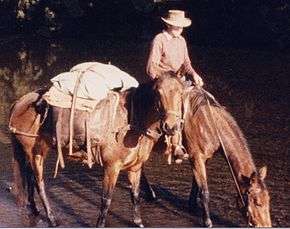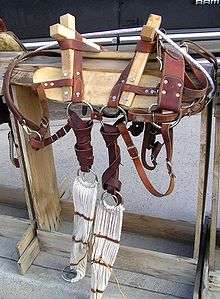Pack saddle
A pack saddle is any device designed to be secured on the back of a horse, mule, or other working animal so it can carry heavy loads such as luggage, firewood, small cannons or other weapons too heavy to be carried by humans.


Description
Ideally the pack saddle rests on a saddle blanket or saddle pad to spread the weight of the saddle and its burden on the pack animal's back. The underside of the pack saddle is designed to conform well to the shape of the pack animal's back. It is typically divided into two symmetrical parts separated by a gap at the top to ensure that the weight being carried does not rest on the draft animal's backbone and to provide good ventilation to promote the evaporation of sweat.
The pack saddle consists of a tree, or the wooden blocks that sit on the horse's back, the half breed which is the canvas saddle cover, the breeching and often a crupper which prevents the loaded saddle from sliding too far forward and the breast collar which holds the loaded saddle from sliding too far back on the packhorse or mule. The flexible bars on this packsaddle adjust to a horse's back and offer several options for hanging panniers, manties or other loads.[1]
There are several styles of pack saddles. The cross buck style has crossed wooden bars to attach sling ropes. The army style of pack saddle has two large metal hooks each side for hanging pack bags or crates. The Decker style has two rings for tying sling ropes.
The modern pack saddle is usually not intended to support a human rider. The upper side of the pack saddle resembles a rack to let its load rest on and be tied on with ropes, straps, a surcingle or other devices. One historical exception was a pack saddle used in feudal Japan by non-samurai class commoners who were not allowed to use riding saddles (kura) for transportation.[2]
See also
- Backpacking with animals
- Packhorse
- Saddle
- SCR-203 pack radio
- Trail riding
References
- Kinsey, J. M.; Denison, Jennifer (2008). Backcountry Basics Colorado Springs, CO. Western Horseman Publishing. ISBN 978-0-911647-84-6.
- "Honda the Samurai". google.com.